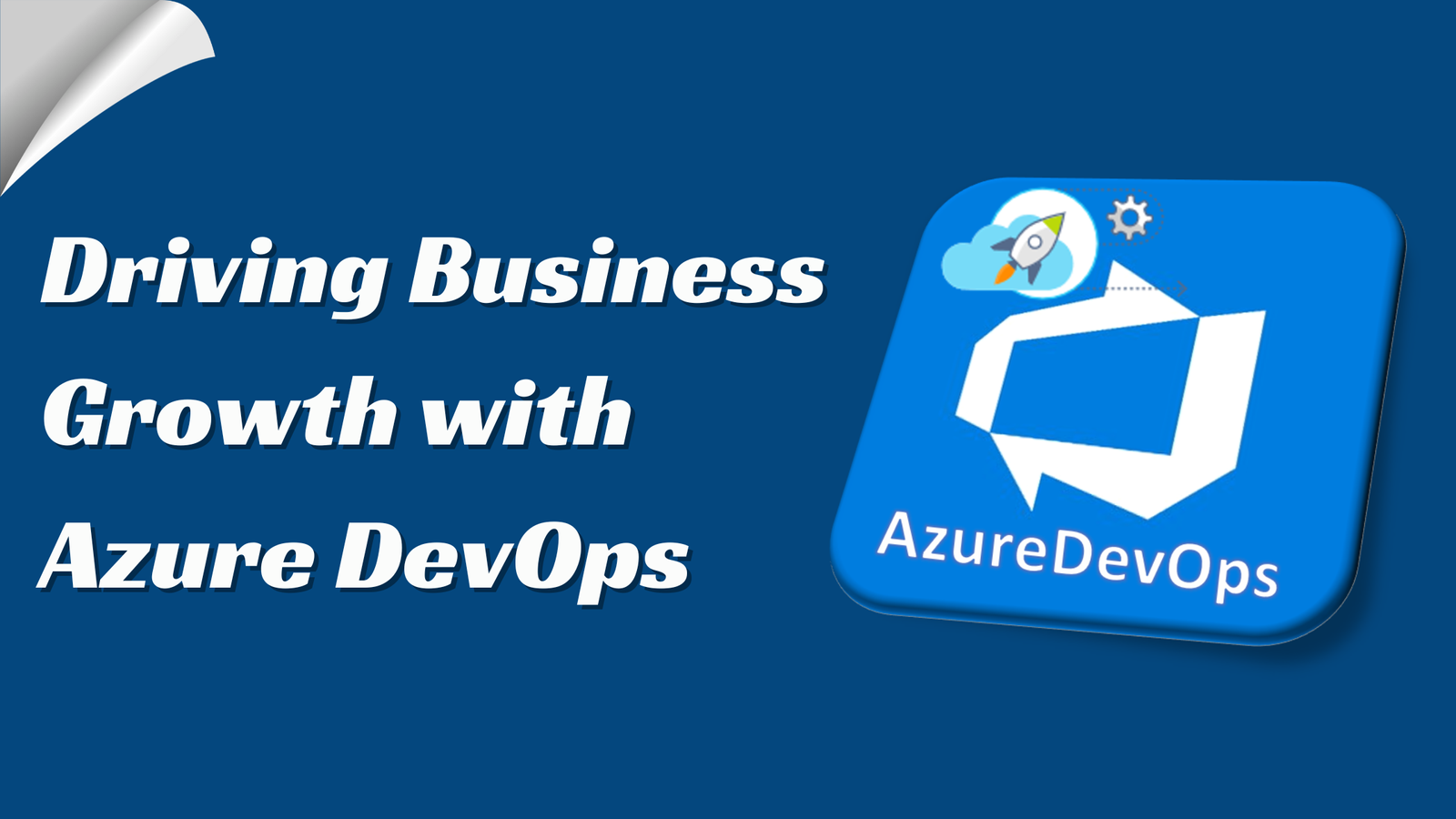Driving Business Growth with Azure DevOps: Let’s Check Out
- 1 What is Azure DevOps?
- 2 What are the Services Offered by Azure DevOps?
- 2.1 1. Azure Boards
- 2.2 2. Azure Repos
- 2.3 3. Azure Pipelines
- 2.4 4. Azure Articrafts
- 2.5 5. Azure Test Plans
- 3 What Benefits Does Azure DevOps Provide for Your Business?
- 3.1 1. Scalability
- 3.2 2. Collaboration
- 3.3 3. Secure and Reliable
- 3.4 4. Sustainable choice
- 3.5 5. Investment efficiency
- 4 Final Thoughts
We frequently hear how crucial it is to be unique and competitive in the market. However, as an entrepreneur, how would you differentiate your company? Is it possible to accomplish that? Are there any concrete methods or plans to adhere to? Honesty, the answer is yes if you employ the appropriate tactics when needed!
A company’s digital transformation is one area that can enable it to adapt quickly; more precisely, what tools and procedures can it use to accomplish this change? Azure DevOps is one technology that has developed recently, and its popularity has increased due to businesses’ growing need for cloud and DevOps.
In this article, we’ll examine the salient characteristics of Azure DevOps and how a company may leverage these features to both revolutionize their industry and stay at the forefront of innovation.
What is Azure DevOps?
Microsoft’s Azure DevOps, formerly known as Visual Studio Team Services (VSTS), is a DevOps service built on the Azure cloud computing platform that combines quality engineering, security, IT operations, and development to deliver better products more quickly. It allows companies to implement DevOps procedures, methods, and technologies to improve customer service and maintain their competitive edge.
What are the Services Offered by Azure DevOps?
Integrated services provided by Azure DevOps cover the whole software development lifecycle.
Furthermore, contingent on their business requirements, businesses possess the liberty to select one or more of the subsequent stand-alone services:
1. Azure Boards
With this service, teams may plan, monitor, and communicate about work, bugs in the code, and other issues using a set of tried-and-true agile techniques. Users can create work items, dashboards, interactive backlogs, scrum methodologies, kanban boards, and planning tools to manage and report on any aspect of the project.
Additionally, boards can be tailored to meet specific workflow requirements and extract insightful data through integrated monitoring and reporting features. Additionally, Azure Boards facilitates interfaces with Slack and Microsoft Teams.
2. Azure Repos
This allows users to have source control over their code through Team Foundation Version Control (TFVC) or infinite, cloud-hosted private Git repositories. Pull requests and advanced file management make it easier to work together to create better code. Users can use any IDE or tool to communicate with Azure Repos on any operating system.
3. Azure Pipelines
Users can automatically develop and deploy applications with the help of Continuous Integration and Delivery (CI/CD) solutions. It works with all platforms, clouds, and programming languages. With cloud-hosted agents, Azure Pipelines can be executed concurrently on Windows, Linux, and macOS.
Additionally, Azure Pipelines allow sophisticated processes and are readily expandable, making it easier to execute multi-phase builds, test connectors, and provide customized reports. Users can push containers straight from the pipeline to container registries.
4. Azure Articrafts
This artefact library service allows CI/CD pipelines to incorporate fully functional package management features. Users can create, host, and share Maven, npm, NuGet, and Python package feeds from public and private sources. The packages can be arranged centrally in a library, pinned exclusively to the project.
5. Azure Test Plans
With the help of this capability, users can enhance apps by integrating a cloud-based testing platform to test code quality at every stage of the development process. It provides tools for scheduled manual testing, exploratory testing, user acceptability testing, and continuous testing.
Using Azure Test Plans, users can create test plans and execute test cases in a pipeline. Furthermore, end-to-end traceability and data collection tools can be used to test on any platform and find and fix problems. In addition, Test Plans facilitate exploratory testing without requiring other tools by supporting the Test and Feedback browser extension.
What Benefits Does Azure DevOps Provide for Your Business?
Enterprise apps let you manage your company more safely and more effectively. Particularly in terms of cloud computing, enterprises can develop, implement, and oversee an extensive range of software solutions.
They can accomplish this by utilizing integrated services, which handle databases and devices running various operating systems and languages. The flexibility of options fosters an atmosphere that is conducive to enterprise functionality.
This solution is especially well-suited for enterprises, as they often face challenges purchasing computer and storage services. Surprisingly, a standard account allows you to access a wide range of services at no cost, making it simple to realize your most brilliant ideas. Additionally, companies may only pay for services they can rely on in this cosy, safe, highly functional cloud environment.
1. Scalability
With no extra coding required, the platform lets apps reach 10 million users rapidly. You can control how many resources are used based on workload and requirements. It doesn’t matter where the user is located.
Furthermore, these modifications can be started both automatically and manually. This is one of Microsoft Azure’s most noteworthy advantages for enterprises.
Additionally, the platform offers scalable unstructured data storage to satisfy the demands of small enterprises. SMB-compatible Azure Files enable speedy data transfer without the need for extra programming.
2. Collaboration
Effective product delivery has several obstacles, one of which is seamless collaboration. Teams can benefit from centrally hosting and managing code using Azure DevOps.
They can completely optimize their procedures in this way. You can manage all code from one area with the Azure DevOps cloud, regardless of whether your team utilizes VB or PowerShell scripts.
But coding is just one benefit of teamwork. Teams can easily integrate popular collaboration services like Microsoft Teams within the Microsoft ecosystem. Furthermore, linking non-Microsoft programs or any other external data sources is simple.
3. Secure and Reliable
Microsoft’s Azure data centres have obtained IRAP certification, achieving the highest cyber and data protection level. With its commitment to operating at 99.95% uptime, Azure DevOps enjoys round-the-clock support.
You can also maintain apps that comply with requirements by managing the Azure DevOps deployment across numerous instances. Developing solutions instils confidence in teams. They perceive Azure DevOps as able to integrate seamlessly without compromising its high degree of security and dependability.
4. Sustainable choice
Using cloud technology is essential to guaranteeing the technological and environmental sustainability of the firm as a whole. Cloud computing is environmentally friendly, as it produces no waste, and it’s trendy these days!
The cloud provides dependable application access and robust security. It also facilitates the efficient use of resources and their distribution.
Virtual machines that are geographically distributed safeguard data and applications against potential disruptions to data centres following industry standards such as ISO/IEC 27001:2013 and NIST SP 800-53. Skilled operations staff members oversee, manage, and administer operations around the clock.
5. Investment efficiency
The management of cloud services doesn’t need to hire more employees or buy more equipment. This contributes positively to the company’s financial stability.
You may forecast investments based on expected consumption by looking at the prices displayed for particular resources and services on the platform. This allows for continual optimization and drastically lowers the cost of Microsoft Azure for small enterprises.
Final Thoughts
It could seem intimidating as you prepare to take Azure DevOps consulting services for the next big step into the future. With so many techniques and tools in the Azure DevOps ecosystem, you’ll likely turn off course if you don’t plan properly.
While implementing Azure DevOps streamlines processes through technology, developing a DevOps culture requires significant adjustments to how individuals cooperate and work together.

















